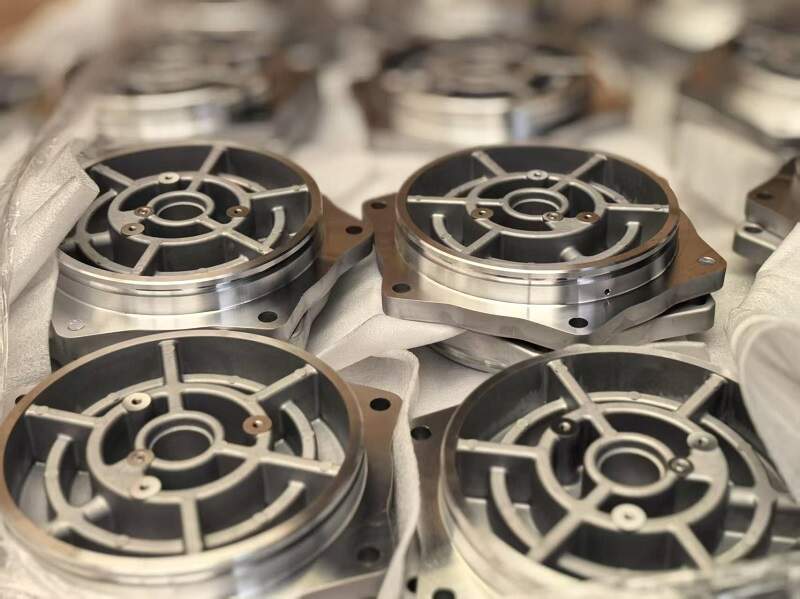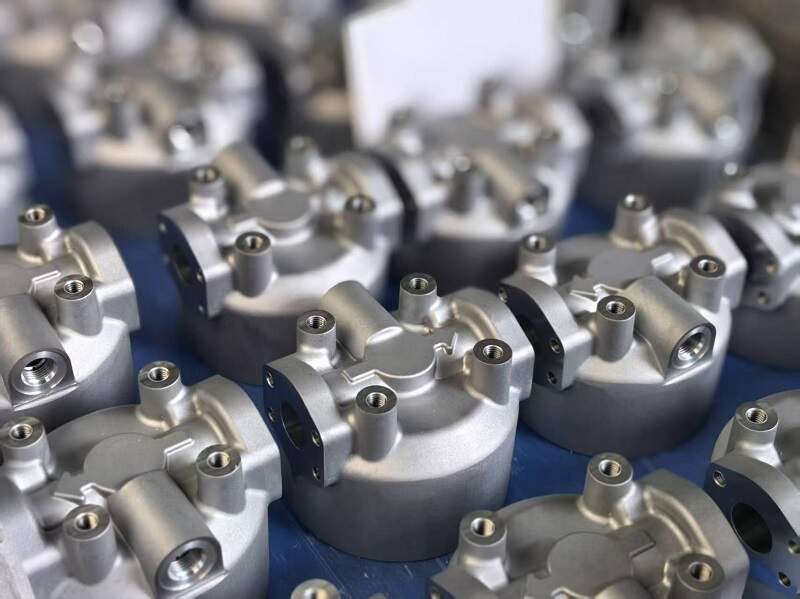Choosing an Aluminum Casting Company with modern capabilities
Just How Foundry Solutions Enhance Manufacturing Efficiency and High Quality in Industrial Applications
Shop solutions play an essential function in boosting manufacturing effectiveness and high quality throughout various industrial applications. By applying advanced steel spreading strategies, these services guarantee elements are produced with precision and consistency. This not just minimizes preparations however also decreases waste, fostering much better partnership between manufacturers and foundries. The influence of high-grade components on functional performance elevates crucial concerns regarding the future of commercial production. What advancements exist in advance in this advancing landscape?
The Function of Shop Providers in Streamlining Manufacturing Processes

Foundries commonly give expertise in alloy development, allowing suppliers to utilize innovative materials that improve item performance. The collaboration between factories and makers promotes a better understanding of manufacturing needs, causing optimized procedures and enhanced item styles. By leveraging foundry solutions, producers can accomplish better adaptability, adapt to altering market needs, and preserve competition in the sector. Overall, the role of shop services is necessary in promoting a more reliable and affordable manufacturing landscape.
Advanced Technologies in Shop Operations
Ingenious innovations are transforming factory procedures, noticeably enhancing efficiency and precision. Automation plays an important duty, with robot systems improving repetitive tasks such as molding and product handling. In addition, developments in computer-aided layout (CAD) and computer-aided manufacturing (WEBCAM) systems make it possible for shops to develop complicated geometries with better precision and reduced product waste.
In addition, the integration of expert system (AI) and device knowing enhances high quality control by monitoring procedures in real-time and forecasting potential defects prior to they take place. Making use of innovative products, such as light-weight alloys and composites, even more boosts the performance attributes of cast items.
Additionally, 3D printing technology is revolutionizing prototyping and tooling, enabling quick modification and minimized preparations. Jointly, these sophisticated technologies not just elevate production performance but likewise assure that the end products meet strict top quality criteria, positioning foundries at the center of modern industrial applications.
Reducing Lead Times With Effective Foundry Practices
Reliable shop practices play a crucial role in lessening lead times within production environments. By implementing streamlined production processes and progressed scheduling strategies, producers can improve process and maximize resource allowance. These improvements not just accelerate outcome yet additionally add to overall functional efficiency.
Structured Manufacturing Processes
Simplifying manufacturing procedures is important for minimizing preparations in the production field. Effective factory techniques, consisting of optimized operations and source monitoring, play an essential role in attaining this goal. By lessening waste and boosting communication amongst teams, shops can considerably improve their operational effectiveness. The implementation of standardized procedures also adds to regular high quality and faster turn-around times, making it possible for manufacturers to respond even more promptly to market needs. Additionally, the assimilation of sophisticated modern technologies, such as automation and real-time monitoring systems, assists in identifying traffic jams and helping with timely interventions. On the whole, a focus on streamlined manufacturing processes not just increases lead times yet additionally enhances the overall competition of industrial applications, ensuring that products meet client browse around this web-site expectations properly.
Advanced Organizing Techniques
Efficient manufacturing processes normally lead suppliers to check out advanced organizing techniques as a means to even more decrease preparations. By utilizing advanced algorithms and software, shops can maximize process, aligning manufacturing routines with need projections and source availability. Methods such as Just-In-Time (JIT) scheduling decrease inventory costs while making sure timely material distribution, thereby enhancing functional effectiveness. Additionally, incorporating real-time data analytics allows shops to anticipate prospective delays and readjust schedules proactively. This versatility not just improves procedures but likewise improves total efficiency. Furthermore, joint preparation with customers and providers can cultivate a more synchronized supply chain, further decreasing preparations. Eventually, these innovative organizing methods equip factories to accomplish greater effectiveness and exceptional high quality in their production processes.
Making Sure Accuracy and High Quality in Metal Spreading
Ensuring precision and top quality in metal casting calls for a meticulous technique that includes every stage of the production process. This process begins with cautious design and design of the molds, assuring they can hold up against the liquified metal's temperature level and pressure. The selection of top quality resources is learn this here now necessary, as contaminations can compromise the end product.
When the materials are prepared, accurate temperature level control throughout melting and putting is basic to achieve the desired properties in the actors steel. Keeping an eye on solidification and air conditioning rates additional warranties dimensional precision and surface area coating.
Quality assurance practices, such as non-destructive screening and inspection, are critical to recognizing flaws early at the same time. Aluminum Casting Company. In addition, employing proficient personnel who recognize the subtleties of steel spreading adds considerably to maintaining high requirements. On the whole, these techniques jointly boost the reliability and efficiency of actors elements in numerous industrial applications
Lessening Waste and Maximizing Resource Utilization

Additionally, reusing scrap steel within the shop itself can substantially reduce waste, changing spin-offs right into usable sources. Lean manufacturing concepts additionally add to waste reduction by enhancing processes and eliminating unnecessary steps, resulting in extra reliable procedures.
Normal maintenance of equipment warranties peak efficiency, avoiding break downs that can result in squandered products. By concentrating on these approaches, factories not just decrease prices yet also add to lasting techniques, straightening with the expanding need for eco accountable manufacturing approaches in commercial applications.
The Competitive Benefit of High-Quality Parts in the Market
Top notch elements give a substantial affordable benefit in the foundry market, where precision and toughness are critical. Manufacturers that focus on exceptional materials and craftsmanship can improve item efficiency and dependability, bring about enhanced customer satisfaction. This benefit is specifically evident in industries such as vehicle and aerospace, where part failure can have tragic effects.
High-quality elements often result in reduced maintenance expenses and prolonged product life-spans, which can be attractive selling factors for prospective clients. As market demands expand for efficient and lasting modern technologies, the focus on quality ends up being much more vital. Business that purchase premium shop solutions not just boost their production processes yet additionally differentiate themselves from competitors that might compromise top quality for cost savings. The dedication to top notch components ultimately translates into a more powerful market placement and long-term company success.
Often Asked Concerns
What Types of Materials Do Foundry Solutions Normally Collaborate With?
Foundry solutions commonly collaborate with metals such as aluminum, brass, iron, and steel, together with different alloys. They also take care of products like composites and porcelains, dealing with diverse commercial requirements and specs in producing procedures.
Exactly How Do Foundry Solutions Effect Overall Supply Chain Monitoring?
Factory services significantly improve supply chain management by enhancing material sourcing, lowering preparations, and ensuring regular quality. Their capability to supply tailored remedies cultivates partnership have a peek at these guys amongst stakeholders, inevitably enhancing total operational performance and responsiveness in manufacturing.
What Industries Advantage A Lot Of From Foundry Providers?
Industries such as automobile, consumer, building and construction, and aerospace goods substantially gain from factory solutions. These industries count on accuracy castings to fulfill stringent high quality requirements and enhance their total manufacturing processes and product efficiency.
Are Factory Services Sustainable and Eco Friendly?
Foundry solutions can be environmentally pleasant and sustainable, particularly when using advanced technologies and procedures - aluminum casting. Innovations such as recycling materials, decreasing exhausts, and optimizing power use add to minimizing their environmental effect in industrial applications

Just How Can Companies Choose the Right Foundry Provider?
Companies can choose the best foundry solution company by examining know-how, manufacturing abilities, quality qualifications, modern technology utilized, customer testimonials, and sustainability methods while making certain placement with their certain project demands and long-lasting company objectives.
Factory services play an essential duty in enhancing production performance and top quality throughout different commercial applications. The partnership between manufacturers and shops promotes a better understanding of manufacturing requirements, leading to maximized processes and boosted product layouts. Effective factory practices play a vital duty in minimizing lead times within manufacturing settings. By employing sophisticated algorithms and software, factories can maximize workflows, straightening production routines with need projections and source availability. Business that spend in premium factory services not only enhance their manufacturing processes but likewise separate themselves from competitors who might sacrifice high quality for price financial savings.